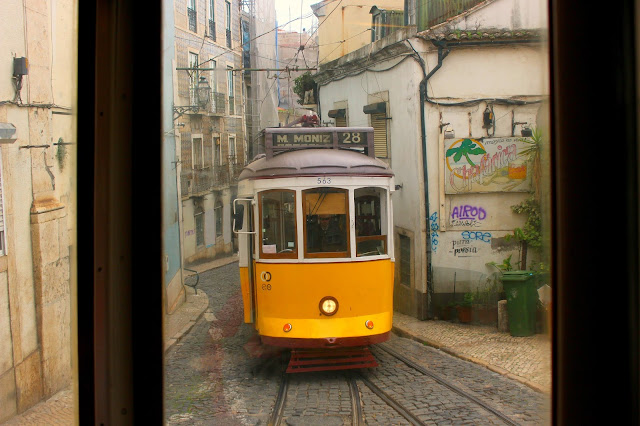What an interesting city. It's like one of those films where you're not sure what you think of it and spend weeks (sometimes years) thereafter mulling it over.
What is immediately striking is the feeling that Lisbon is 'on the cusp of something' - building up to what one might consider brilliant, where others might pine for the city they are recognising less and less.
There's construction on practically every corner, cranes perforating the view of many a 'miradouro' (river view) and it's hard not to wince as the famous yellow 28 tram chugs past, crammed with bodies, as it shudders up and down crooked, cobbled streets. Tourism, it seems, is spilling into the capital city of Portugal faster than it's had time to prepare for it, literally shoving strangers shoulder to shoulder with locals, and it's a bit of a squeeze.
This sentiment is scrawled all over the walls: 'Fuck Airbnb. Queremos vivir aqui' (we want to live here) - or - 'We don't want your start ups'.
We discover that the Timeout Market - Mercado Riberia - is on pretty much every tourist guide for the city and has given new life to a section of an old marketplace. It's bustling in one corner with its admittedly gorgeous-looking food stalls, although their personality is glossed over in the same uniform black and white font and facade, and you can't tell one apart from the other. It's beautifully done, with gentle jazz music wafting through the space, but we're not convinced that it has any soul.
The other quarters of the marketplace are crumbling and dusty, dotted with bright fruit and veg stalls that don't look quite open. Tired-looking vendors cast a wary gaze across stray punters who have no intention of buying a single thing. It's a stark contrast of the old and the new sitting side by side, with nothing in the middle.
We spend an afternoon looking for a little bar that comes recommended - Jasmim - smack bang in the middle of the city's oldest and more notorious districts; the Mouraria. It's difficult to find as we amble along the steep and narrow streets of an area that has remained remarkably intact despite earthquakes and boasts of being the birthplace of 'Fado' - traditional Portuguese guitar music. Street corners loom with crowds of troublesome-looking gangs that regard you with a cool eye but barely breathe a word, even though you might expect them to bark.
We take a seat at the outside terrace, that echoes with the shouts of women laughing and talking with each other across the buildings. The owner - Miguel - refuses to serve us 'ginja' (a supposedly local drink) and brings us the 'real local drink': an almond liquor called Amarginha. We remark that, despite the curiously polite gangs, we finally feel as if we've found a part of the city with 'real life'.
Half-way through our visit, a TV crew turns up to film a documentary as old women hover and shadow the window-frames surrounding us, listening with flat, neutral expressions as they gaze over their washing lines, their mouths set in straight lines across hollow cheeks.
We return the next evening to find out what the filming was for and Miguel tells us they are interviewing old businesses vs. the new.
"I've been here now for 5-years.When I first came, you could barely get into this district without trouble. I'd open the shutters to the sight of menacing, snarling faces that simply didn't want me in the area. These days, I have no trouble. They know they have to behave or they're out - they know what's good for business is good for them."
We nod, to indicate that we understand, that we empathise with what he is saying but he then goes on:
"80% of the people in this area are on benefits. They're trouble. If they don't like it, they ought to go."
This throws us off our guard somewhat, but before we can challenge what may or may not have been muddled in translation, a man begins to play Fado and we're mesmerised.
He pauses for a 'musician's cigarette' and tells us that the British and the Portuguese swapped the guitar for port and asks us for our opinion on Brexit, the ember of his joint glowing fiercely in the dark as he draws long lungs full. We embark upon a long discussion, going back into the depths of British and Portuguese history and come full circle from the new to the old, and back again.
It's clear from our time here - at least for us - that Lisbon is a divided city, as much as the world is and always has been, only it's physically visible. The city and its residents do not want to crumble, and yet they don't want to become unrecognisable in the midst of renovation, and so two sides are formed.
The fight between the old and the new is calling out in the only way it knows how - win or lose - when it really ought to be calling out for a sentiment echoed and needed the world over: the tenacity to wage conversations - not war - to find commonality and meet compromise, and, ultimately, collaborate.
Will Lisbon be the first city to do it?
Time will tell.
